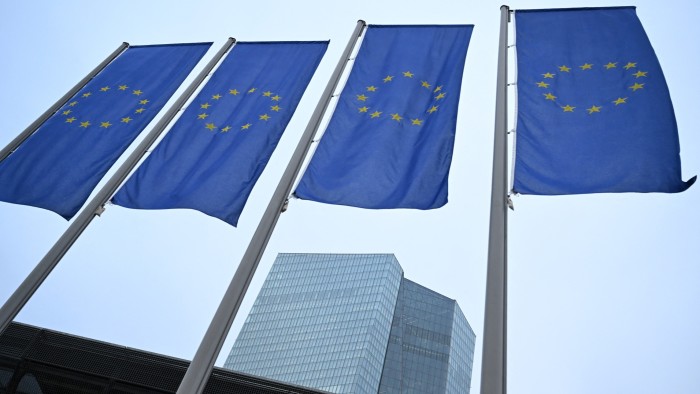Stay informed with free updates
Simply sign up to the European banks myFT Digest — delivered directly to your inbox.
Eurozone bank shares are poised for their highest end to the year in more than a decade after lenders weathered a fall in interest rates and promised record shareholder returns.
The Euro Stoxx Banks index, which tracks the biggest lenders in the currency bloc, is on course to close the year above 142 for the first time since 2010, having jumped by more than a fifth in 2024.
Profits at European lenders have been boosted over the past three years by higher interest rates. But even as central banks started to cut rates this year, fears about pressure on lenders’ net interest margins did not weigh on share prices.
“European banks have had another great year,” said Andrew Stimpson, an analyst at Keefe, Bruyette & Woods. “The market was much more fearful about the effect of falling rates than it needed to be.”
He added that lenders had successfully hedged against the drop in rates — so-called structural hedging — meaning “a lot of the gains in profitability are protected as rates fall”.
Banks generate profits on the difference between the interest they receive from borrowers and pay out to depositors, known as net interest income.
UniCredit was the best-performing large bank stock in the Eurozone, gaining more than 50 per cent in the year. Italy’s Intesa Sanpaolo climbed more than 40 per cent and Germany’s Deutsche Bank saw its shares rise by more than 30 per cent.
BNP Paribas was among the worst performers in the sector, with its shares down almost 8 per cent.
Despite subdued dealmaking activity and muted loan growth, 2024 marked one of the most profitable years for European banks thanks to higher rates and structural hedges. As a result, the sector delivered an average return on equity of about 13 per cent, according to analysts at Citigroup.
The earnings fillip allowed lenders to return record levels of capital to shareholders, as bosses sought to appease investors who had previously been spooked by dividend bans and windfall taxes across Europe.
KBW’s Stimpson said European lenders completed about €45bn of share buybacks during 2024, paid out €19bn in interim dividends and will hand out about €69bn in final dividends early next year.
The capital returns mark a significant reversal from 2020, when the European Central Bank ordered lenders to freeze dividends and share buybacks at the start of the Covid-19 pandemic, a move that damaged the reputation of the sector among international investors.
Despite strong earnings performance in 2024 however, many European lenders still trade at discounts to the book value of their assets and their US peers, which gained fresh impetus after the election of Donald Trump as president.
Citi analysts said: “In 2024 [European and US] banks were tracking closely until the US elections, where confirmation of a Trump/Republican clean-sweep victory resulted in strong outperformance by the US banks, on the assumption of US deregulation, potential tax cuts and greater fiscal stimulus.”
European lenders are turning to M&A as they try to find cost savings and economies of scale, with rates expected to fall further and the economic outlook for Europe subdued.
UniCredit last month made an offer for domestic rival Banco BPM, which was rejected, and built a large stake in Germany’s Commerzbank. Spain’s BBVA also launched a hostile bid for Sabadell, which is currently being held up by the country’s competition regulator.
Citi analysts said they expect net interest income across the sector to drop slightly in 2025 as structural hedges only partly offset lower interest rates.
However, KBW’s Stimpson forecast that as rates fall further, loan growth would pick up, “particularly in the periphery of Europe where those economies have spent 15 years deleveraging”.



